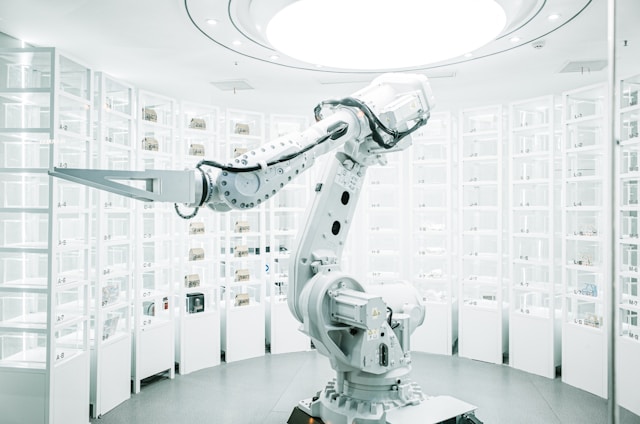Artificial intelligence systems have become ubiquitous in almost every industry. They are divided into four categories or types. So far, we have used reactive machines and weak artificial intelligence systems in our daily lives. This article discusses the types and applications of artificial intelligence across industries.
Table of Contents
The use of computer systems and the internet has made information technology make automated machines that reduce human work. With artificial intelligence, machines can replace humans by doing the work themselves. Artificial Intelligence is a concept used to design an agent that performs a specific task, understands the environment, and takes actions accordingly.
1. Artificial Intelligence Types
- Reactive machines: It is a Type 1 artificial intelligence machine or application that does not use memory but makes predictions. A Deep Blue chess board is an example of a reactive machine developed by IBM that has no memory but predicts possible moves in the game and chooses the best move. It does not predict the future but makes decisions according to the shifts.
- Weak AI: Artificial intelligence solves small problems that can store and use data from the past. It automates routine jobs to speed up work and reduce human intervention. It uses less memory and is categorized as Type 2 artificial intelligence. It is also called narrow AI or Artificial Narrow Intelligence(ANI). Currently, we use Weak AI applications in our daily lives, such as speech recognition, image classification, natural language processing(NLP), pattern recognition, self-driving cars, target advertising, sales prediction, and weather forecasting.
- Strong AI: It is the intelligence used to solve more complex and real-time problems in the world. Strong AI is the future that thinks and responds like the human brain. Strong AI is also called Artificial General Intelligence or General AI. Technological singularity occurs when Artificial intelligence overtakes human intelligence. It comes in the Type 3 categories of artificial intelligence, where machines understand and respond as per circumstances.
- Super AI: is intelligence beyond human intelligence. It is the next step after reaching the singularity. Integration between Humans and machines could occur through a brain chip interface. Superintelligence machines will work in ways that are impossible with the human brain. However, this is just a prediction.
2. Applications of Artificial Intelligence
Artificial intelligence has made the business market more competitive and more profitable. It is used in almost every sector aspiring to reduce threats, automate work, increase efficiency and productivity, and improve decision-making and safety. The list of industries leading in artificial intelligence are:

2.1. Oil and Gas Industry:
Oil and gas industries are investing in AI to improve their pricing and decisions. Performance depends on consumer preferences, sales, prices, and employee satisfaction. AI tools help to explore oil and gas’s market performance. Recently, BP has invested in Belmont Technology to get insights from geophysics, reservoirs, and project information to enhance its market performance.
2.2. Mining Industry:
The mining industry uses AI technology to improve performance, enhance decisions, get insights from data and predict the right location to find resources.
2.3. Health Care Industry:

Healthcare systems use applications like artificial intelligence for drug discovery, ML algorithms, and other applications to make treatment more effective and detect diseases according to the reports of patients. Today in some countries, healthcare systems are using artificial intelligence and machine learning to improve the diagnosis of humans and make treatments cost-effective.
IBM Watson and chatbots are artificial intelligence applications used in the healthcare system to fix appointments and present patient health reports according to the data given to them. Artificial Intelligence for Drug Discovery (AIDD) is a big data and AI platform discovering the link between disease and drugs. Artificial intelligence will have a tremendous effect on the healthcare industry in the future.
Researchers are trying to use AI to detect life-threatening diseases in an early stage and accelerate drug discoveries. Prosthetics, where an artificial device functions as a body part, will also advance.
2.4. Entertainment and Gaming Industry:
Currently, websites like Netflix and Amazon use an ML algorithm to analyze customer activities and display them according to customers’ needs. They also offer discounts and gift cards to their regular users.
Film industries use AI systems to create creative trailer content and enhance digital effects to attract users. The gaming industry uses big data and AI to create AI-driven characters and enhance user experiences.
2.5. IT Industry:

Business organizations use artificial intelligence and robotics to automate repetitive work and make production easier and more effective. Artificial intelligence has also enabled the CRM platform to analyze hidden data for better decisions. The information technology department uses automatic exploit generation(AEG) to secure data and detect bugs and AI to detect cyber-attacks.
Retail and E-commerce industries use AI to improve user experiences, understand customer needs, provide support through chatbots, and provide a secure gateway for online payments.
2.6. Financial Industry:
Finance-based companies use AI applications to analyze social media to determine brands’ popularity. Chatbots are used in banking sectors to answer customer queries, and fraudulent transactions are detected using decision intelligence technology. Mint and TurboTax are AI-based applications that help users by giving them financial advice according to their financial conditions.
2.7. Logistics and Transportation Industry:
This industry is revolutionizing the use of AI. AI and predictive analytical tools have transformed the supply change management process. Smart robots are used in packaging and sorting the products in the warehouse. The industry uses AI algorithms to find the quickest and best routes to meet the last-mile delivery.
In some countries, self-driving vehicles are used to make deliveries safely. AI technology will also be used in other transportation, such as buses and trains, to manage traffic issues and increase convenience and comfort for travellers.
2.8. Manufacturing and Automotive Industry:
AI is used in the manufacturing industries to make work easier, such as robotic vehicle manufacturing, finding micro-object defects, predicting product breakdowns, etc. It is also used in automotive industries such as Tesla and Uber, which use AI tools and applications in their production. AI algorithms and robots are becoming an integral part of the manufacturing industries.
2.9. Educational Industry:
Artificial intelligence is used in the education system to assist students and generate reports according to their performance. Synap is a platform that helps students create and share quizzes on subjects with peers to enhance their study experience. AI algorithms will soon help explain complex theories and concepts effectively.
3. Final Thought
Artificial intelligence is a wider concept used in every industry. It has a great impact on the work. Today, organizations use AI and machine learning tools to increase performance and efficiency. From decision-making to production development, AI has been in every industry.
New equipment and technologies are being developed for future use. However, every technology imposes a security threat if not used properly. So education and knowledge about technology can only be beneficial.